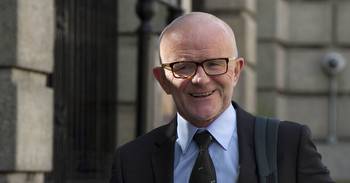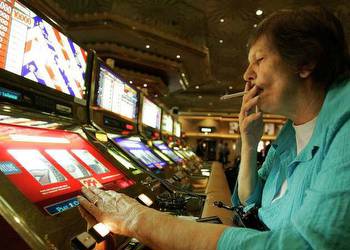Mick Clifford: Don't bet the house on brave new gambling laws

When I was a lad of tender summers, there was a mysterious shop in town bearing the legend ‘Turf Accountant’. An accountant, I knew, counted money.
So, I concluded, what went on behind the closed door and tinted window of the turf accountant was the totting up of how much money the local farmers made through extracting turf from the brown bogs out beyond the edge of town. I was old enough to legally take a drink by the time I copped that a turf accountant was a bookie.
So it went in Ireland of the vices. To have labelled a betting shop as a betting shop would have been to publicly acknowledge that gambling went on there. Better to shroud it in mystery, keep up appearances, pretend that something dour and sober was being transacted within.
In terms of the dangers of gambling, those days now appear quaint. After all, there was little beyond the gee-gees on which to place a bet. The activity was partaken among a small community of like minds, where a sage nod through a thick cloud of cigarette smoke could convey the knowledge that the favourite at the 3.40 in Chepstow was carrying a bandy leg.
Today, gambling is again hidden away but in a completely different universe. The stereotypical heavy gambler is at home in bed, half-dressed as if he’s unsure whether to address the day. He has a phone raised to within eight inches of his face as he has bet a packet that the first goal in the South Korean second division match between two unpronounceable clubs will arrive before half-time.
His heart is racing in pursuit of last night’s losses and his breath is shallow. There is nothing between him and the bet, no teller behind a counter with a kind word, no fellow desperado placing a hand on his sleeve, no closing time. He is unmoored from social norms and he wouldn’t know a turf accountant if it hit him between the eyes.
Gambling is getting a bad rap right now and not without reason. Last week, at the launch of a new support service, Gambling Awareness Trust (GAT), it was revealed that the number of people seeking treatment for problem gambling had increased twentyfold in just four years.
Michael Guerin, a counsellor working in the Cuan Mhuire centre told the Irish Examiner that half of the clients coming forward with addictions are under the age of 35. “We believe that in the future problematic gambling will progressively become a greater issue for young people,” he said.
Estimates vary, but GAT says that its research suggests that around 55,000 people may be affected by problem gambling.
We live in a media age that is saturated with gambling. Every sporting occasion is accompanied by the most sophisticated, expensively made adverts designed to present gambling as a fun-loving past-time that will add a frisson of excitement to the occasion. For some, of course, it will but not so for others.
Belgium has recognised the inherent dangers. Last month, the country’s minister for justice Vincent Van Quickenborne announced a crackdown on advertising, which will no longer be allowed on mass media forums, including TV, radio social media, and newspapers. The minister declared that “gambling is the new smoking” in respect of advertising.
Coincidentally, Taoiseach Micheál Martin made a similar comparison last week. He stated that gambling addiction should be dealt with in the same way smoking has been tackled with “the full gamut of advertising regulation”. Great words of wisdom from the leader of the government but there has been precious little action to that effect so far.
Even within the industry, it is accepted that things can’t go on as they have. Paddy Power, the spokesperson for the bookie giant of the same name, acknowledged this in a recent podcast.
“It is not as much fun being in the industry now as it was back in the day because of how the industry is considered,” he told the Irishman Abroad podcast. “It would be pretty toxic now. That wasn’t the case 10, 15 years ago.”
The reality is that the industry has only itself to blame. Despite plenty of bleating, the suspicion remains that precious little has been done to address problem gambling from within. And now the government is intent on tackling the issue by introducing a new gambling regulation bill.
Unfortunately, it may be a case of too little, way too far down the line. The recommendations from the Oireachtas Justice Committee certainly appear to be tip-toeing around the issue. For instance, it proposes measures like “better verification to be used to check the ages of users placing bets online or in shops”; and “avoid overpopulating gambling centres within more deprived neighbourhoods” and that “advertising be banned pre-watershed.”
This is playing out against a background in which eight government TDs and senators were recently wined and dined at a meeting in Punchestown by the Irish Bookmakers Association. While there is obviously no quid pro quo involved, the optics are appalling.
Public health and welfare demand that the government finally gets tough with the industry, yet some lawmakers have no issue with being softened up by a day at the races. Perhaps some of them should make a point of spending time with people like our friend who can’t get out of bed until the half-time whistle sounds at the game in the South Korean second division.
The big stick being proposed is the establishment of the office of a gambling regulator. This office will keep an eye on things and, apparently, that is enough to ensure that the industry will do right by all its customers and society at large. Some who know the industry well aren’t buying it.
Fintan Drury is a former director of Paddy Power, who along with the company’s former chief executive Stewart Kenny, set up a campaign group, Stop Gambling Harm.
“It doesn’t go far enough,” he says. “From what we know of what’s emerging it is nowhere near substantive enough to address fundamentals. The idea that the solution is to set up a regulator’s office is at best dismissed by the fact that the UK has had one for many years yet it is undertaking a white paper at the end of this month because it recognises that the regulator isn’t armed with the necessary legislation to act.”
The approach, it would seem, is to instead apply a sticking plaster. Once more, when the public interest is pitting against vested interest, the government of the day is treading carefully rather than acting decisively.
In years to come, there is every likelihood that society at large will look back on these times similar to how we now view the wanton disregard that applied to advertising and sponsorship by cigarette companies until recent decades.
This is the time to act decisively rather than wallowing in regret when it’s far too late. It shouldn’t take much political courage to do so.


































